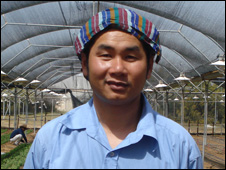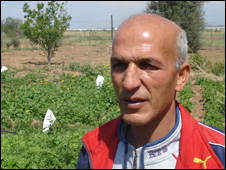
After the Israeli government stopped Gazan workers from crossing the border farmers have had to look as far afield as Thailand for workers
|
By Jon Donnison
BBC News, Gaza
|

The beautiful moshav or communal farm at Netiv Haasara in southern Israel, right on the border with Gaza, is green, lush and fragrant with jasmine and orange blossom. In the moshav's vast greenhouses they grow everything from cucumbers to coriander, peas to peppers.
 |
 It was much nicer to have Palestinian workers coming across. I wish it could change
It was much nicer to have Palestinian workers coming across. I wish it could change

|
The sounds and smells are pretty typical of Israel in springtime - except, that is, for the murmur of conversation in an unlikely language - Thai. "Virtually all our workers here are Thai," says Roni Keidar who runs a seed production business on the moshav. "We tried to get Israelis to do the work but it's too difficult. It's too hot for them in the greenhouses," she says. "Too posh to pick?" I ask. "Maybe," Ms Keidar laughs. The Israeli government says there are around 28,000 Thais working legally in Israel. And with the farms located close to the border with Gaza, there is a risk from the rockets Palestinian militants fire into Israel. Last month a Thai farm worker at Netiv Haasara became the first person in Israel in more than a year to be killed by a rocket fired by Palestinian militants in Gaza. Cheap workforce But for many it is a risk worth taking.

Kai has only a few months left on his visa
|
"I earn about a thousand dollars a month here," says 33-year-old Kai, who gives only his first name, as he picks coriander. "That's double what I could earn back home." Kai has worked here for four and half years. He has six months to go on his five-year visa. He is doing work that used to be done by another cheap workforce just down the road. Netiv Haasara is right on the border with Gaza. Standing by the greenhouses you can literally touch the huge concrete wall that separates Israel from the Palestinian territory. Less than a kilometre from Netiv Haasara is the Erez Crossing, the main checkpoint from Gaza into Israel. These days just a trickle of people are allowed to cross. Unemployed But until the start of the second intifada, or Palestinian uprising, in 2000 when Israel tightened the border, thousands of Gazans used to travel daily through Erez to work on Israeli farms.

Mr Zania worked for 17 years on the farm
|
I meet one such Gazan next to his small house in Beit Hanoun. The walls are riddled with bullet holes from Israel's offensive in Gaza just over a year ago. Like more than 40% of Gazans, Khalil Zania is unemployed. But for 17 years he helped keep bees and picked flowers on the moshav where Roni Keidar now has her farm. "After the intifada they started using foreign workers and we had to stay home. It makes me feel sad. Palestinian workers were very good," he says. Mr Zania says he still talks on the phone to some of the friends he met in Israel.
And Roni Keidar said her Gazan workers were "part of the family". "We used to go to their weddings or birthday parties in Gaza. They would come and eat at our house," she says. Although she says it's "crazy" to be using workers from halfway around the world when there is a huge unemployed workforce so close to home, she can see why the Palestinians are not allowed in. "It's because of terrorism," she says, adding that when the borders were open, there were suicide attacks in cities such as Tel Aviv. "It was much nicer to have Palestinian workers coming across. I wish it could change."
|
Bookmark with:
What are these?